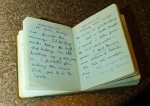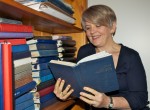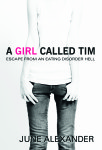Writing our own life canvas
Writing our own life canvas
As a diary-writer since age 12 (goodness, that’s 50 years of diary-writing!), I appreciate the importance of narrative – of writing as a survival and coping tool, as a form of self-expression, as a safe place in which to explore who we are and strive to make sense of our life.
Pouring out thoughts and feelings – on paper or through the keyboard – helps us know who we are, and work out what direction to take. As we evolve, our growth is reflected in what we write – words are a great companion. We create our own life canvas. Words are a great friend. Let’s use them. Lots!
Carrie Arnold writes a great post on the power of writing in the stories we tell ourselves – narratives and eating disorders.
Certainly, words are a powerful form of communication. Sharing our feelings and thoughts helps to avoid misunderstandings, helps us to understand our own self, and others to understand us.
| My memoir,A Girl Called Tim, is about a journey of more than 40 years with two eating disorders. I was 11 years old, in Grade Six at primary school, when I developed a mental illness called anorexia nervosa. It starved my body and I became emaciated. Eventually I gained weight and everyone, including me, thought I was well again. But anorexia hid inside my brain, and continued to sabotage my mental and emotional health. |
The introduction to A Girl Called Tim describes why words are important to me:
My memoir is written almost entirely from my diaries, which I began writing at the age of 12. The process of diary writing

Writing a diary since age 12 has provided a road map of my life journey and along the way, it has provided much comfort, too.
was important for, although not aware of this at the time, it helped me stay alive. Many years on, when I summoned the courage to read my journals, I was rewarded with a heightened understanding of self, of the influences and environment that shaped my childhood. This was liberating in moving forward with my present. For decades my life had seemed like a jigsaw puzzle – there were pieces missing. I had gaping holes within. My diary contained clues to help heal and fill those gaps.
Isolated by my illness, my diary was frequently my only friend, my only link with a tiny thread of self. Often, tears soaked the page as I off-loaded loneliness, despair, alienation and rejection. Other times, my writing ran crookedly over the page, thoughts spilling haphazardly out of a mind numb from bingeing or heavily dosed with prescription drugs.
My love of the written word began when I was three. My earliest memory is of sitting cross-legged on the linoleum-covered kitchen floor, turning the pages of the daily newspaper and thinking: ‘When I grow up I will read every word on every page’. Even the tiny print in the Birth and Death columns. Words were fascinating. They were full of promise and possibilities. They could describe and express, reveal and reflect. Their shape, their look, big words, little words, the way they could mix and match to mean and convey different things – was mesmerizing. They were friendly. Above all, they were an escape from the outside world.
They connected with me and when I wrote them, they belonged to me.
When given a small, soft-covered diary for my 12th birthday, the little book quickly became my best friend.
Initially, entries were mostly matter-of-fact observations. I went to school at this time and came home at that time. Expression of emotion – happy or sad – was rare. As our relationship grew, I began to share my heart and soul. Some entries were cryptic due to concern that my mother read my entries while I was at school and for several months, I resorted to writing entries in shorthand, to defy her curiosity.
Reading my diaries, from age 12 to 55, was cathartic and often scary.
I felt I was tumbling back in time, re-living an arduous journey to regain my life and be ‘normal’. I felt I was climbing my mountain all over again.
When I wrote my first diary entry on January 1,Tuesday, 1963, almost a year had passed since I developed anorexia:
Woke up at 5 o’clock. Had breakfast at ¼ past 7. I had 1 round of toast + 3 bits of meat ….
* I will be with my books in Brisbane next week. See you there!








